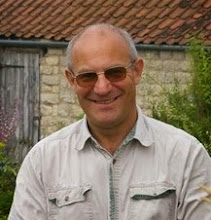We are very lucky that not far from here, at Shurdington on the outskirts of Cheltenham, are The Dawn Nurseries, a family-owned traditional nursery producing flowering potplants. In spring they supply us with pelargoniums and other bedding and tub plants: at this time of year they are offering their winter specialities, cyclamen and poinsettias (as well as doing a roaring trade in Christmas trees and associated evergreens). It is a pleasure to see really well-grown plants that are properly cared for - look at the spacing of the cyclamen on the tables in the picture above, for example. They are placed to allow ample room for air circulation between the plants, thus reducing the risk of botrytis in their centres. The plants are offered at prices that are only slightly higher than those charged by supermarkets for a far inferior product. For some weeks I've been scowling at poinsettias in our regular supermarket that claim to be guaranteed for so many weeks, yet have clearly been chilled and are already dropping their leaves.
 |
| Euphorbia pulcherrima 'Tapestry' |
It is a very curious fact that, despite being apparently a very long-established part of the Christmas tradition, poinsettias only started to become widely known in the 1920s. They were first vigorously promoted by Paul Ecke, a Californian nurseryman, who grew them as an outdoors, open-ground crop, on a large spread just north of San Diego, and his son Paul Ecke Jr, who brought them into the greenhouse, until they became an essential feature of the All-American Christmas, and the rest of the world followed suit. The Ecke Ranch, now under the management of Paul Ecke III, continues to lead the way in poinsettia breeding and cultivation, as may be seen from their catalogue. Their plants are sold across the world, being shipped as cuttings from their production nursery in Guatemala, for growers (such as The Dawn Nurseries) to produce into finished plants according to the strict growing schedules provided.
 |
| Joel Roberts Poinsett (from WikiCommons) |




























Your excellent post brings back a childhood memory of moving into our house. Planted out front was a row of those old-fashioned E. pulcherrimas, eight feet of bare stems topped with two inches of foliage.
ReplyDeleteI'm so glad you found your way to my blog so I now have some excellent holiday reading to look forward to on yours. Such an unlikely plant to build a nursery empire on, but I guess it had the "right stuff," which the Eckes had the business and technical savvy to exploit. Your "dealings" with the Eckes sound like there's more to the story!
ReplyDelete